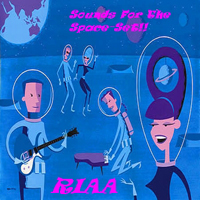 Robotic Intergalactic Astro-Artists (RIAA) |
Let me begin this post with the following caveat: P2P Sharing of Copyrighted Music is WRONG. It is stealing, and there is no rationalizing our way out of it even though most of us, myself included, have done it from time to time.
That being said, I’d also like to add: Frak the Recording Industry Association of America (RIAA).
If you haven’t read the Electronic Frontier Foundation’s (EFF) recent publication, “RIAA v. The People: Four Years Later (PDF Warning),” it makes a pretty damning case that the RIAA is just as immoral–no, more immoral than those they are prosecuting:
The organization recently targeted a fully disabled widow and veteran for downloading over 500 songs she already owned. The veteran’s mobility was limited; by downloading the songs onto her computer, she was able to access the music in the room in which she primarily resides. The RIAA offered to settle for $2000—but only if the veteran provided a wealth of private information regarding her disability and her finances. (Emphasis mine.)
John Paladuk was an employee of C&N railroad for 36 years and suffered a stroke in 2006 which left his entire left side paralyzed, and severely impaired his speech, leaving him disabled with his disability check as his only source of income. Despite this, the RIAA has filed suit in Michigan against Mr. Paladuk, even though he lived in Florida at the time of the alleged infringement and has no knowledge of file sharing.
How many innocent people has the RIAA sued?
In addition to Sarah Ward, the grandmother wrongly accused in the very first round of lawsuits, the RIAA in early 2005 sued Gertrude Walton of Mount Hope, West Virginia, who had passed away months before.60 In yet another case, Lee Thao of Wisconsin was sued for sharing files when both the RIAA and the ISP overlooked the fact that Mr. Thao was not actually a customer of the ISP at the time of the alleged infringement, though his old cable modem remained registered to his name.
As if these injustices weren’t enough, the RIAA then goes lower than naked mole rat poop with its “deterrence and education initiative,” where they send threatening letters to college students demanding they pay $3,000 or be sued:
…those receiving pre-litigation letters can simply settle their cases by paying the settlement with a credit card, without any aspect of the case ever entering the legal system. This in turn saves the recording industry a substantial sum of money by completely avoiding the costs associated with actually having to file a “John Doe” suit. The “reduced” settlement amount, in other words, represents the record companies’ savings from cutting out the middleman—our justice system.
So the RIAA’s changing its business model. Since it wasn’t able to keep up with the swift pace of technological change and incredible expansion of choice the InterWebs have brought consumers, it’s going into the business of suing those consumers.
As the EFF convincingly demonstrates, these lawsuits are doing nothing to slow down P2P use and other sharing methods, such as CD/DVD ripping, and the effects are devastating to the music industry, where CD sales are down 20% from 2006.The EFF’s proposed solution would make money and increase competition in the marketplace: Offer a subscription-based, download-all-you-want (DRM free) online service. This business model has been suggested for Rhapsody and other music download services, but all of these come with DRM, which disables the music if you let your subscription lapse.If they won’t offer consumers this choice, there is the option to sue them right back:
Debbie Foster was originally sued in November of 2004 when an account she owned was found to be sharing files. Foster admitted owning the account but was ignorant of any file sharing software.68 A year and a half after filing suit, the RIAA dismissed the case. In July 2007, the court awarded Ms. Foster $68,685 in attorneys fees, marking the first time the RIAA has been ordered to pay a defendant’s fees. In the meantime, the RIAA has sued Foster’s 20-year old daughter for the alleged file sharing.
Single-mom Dawnell Leadbetter is also fighting to get her attorney’s fees paid after two years of litigation with the RIAA.71 After having his case dismissed, Rolando Amurao countersued for a declaration of non-infringement and a finding of copyright misuse. Meanwhile, accused filesharer Suzy Del Cid filed a number of counterclaims against the RIAA, including claims of trespass, computer fraud, civil extortion, and civil conspiracy.
Another way to fight the RIAA, and my personal favorite, is to boycott their product. Why let them tell us what we should listen to? There’s plenty of great, and free, stuff out there. Like that fantabulous album recently put out by that other RIAA, the Robotic Intergalactic Astro-Artists.
Check it out and enjoy.
Comments
3 responses to “EFF RIAA vs The People Report”